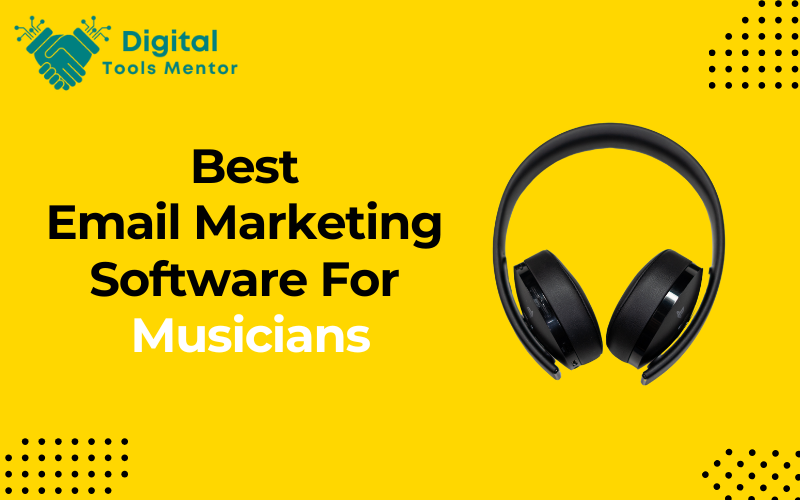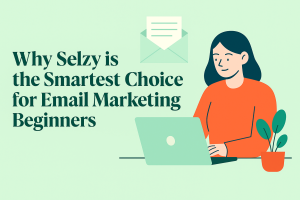7 Best Email Marketing Software for Musicians in 2025
Once upon a time in a world filled with melodies, rhythms, and beats, musicians faced a daunting challenge. They could make their guitars wail and their keyboards sing, but when it came to reaching their audience in the digital realm, many felt like they were playing to an empty room. Emails could be the bridge between their music and their fans, the secret sauce that turns casual listeners into lifelong supporters. But the cacophony of options left them bewildered: Which email marketing software would let their message truly sing? If you’ve ever felt like one of these musicians, staring at your screen and wondering how to harmonize your digital presence with your musical creativity, then you’re in the right place. This blog post aims to shine a spotlight on the 7 Best Email Marketing Software for Musicians, tools that understand your unique needs and let you take center stage in the inbox symphony.
7 Best Email Marketing Software for Musicians in 2025
1. Brevo
Brevo, also known as SendinBlue, offers musicians a range of features that go beyond simple email blasts. With its sophisticated segmentation and automation capabilities, you can target fans based on their listening preferences, past concert attendance, or even merchandise purchases. Its SMS marketing feature also lets you connect with fans directly to their phones, perfect for last-minute gig reminders or special ticket offers. Plus, its pay-as-you-go pricing is friendly for artists working on a budget.
2. GetResponse
GetResponse can be a boon for musicians looking to deepen fan engagement. Its unique selling point is the webinar hosting feature, which musicians can use to hold virtual meet and greets, album listening sessions, or even online music classes. With powerful analytics and easy-to-understand reporting, GetResponse makes it easy to track fan engagement and fine-tune your email strategies over time.
3. EMercury
EMercury offers bulk email services that are particularly useful for musicians who have a large fanbase and need to send out mass notifications, such as album releases or tour dates. With features like advanced scheduling and detailed analytics, E Mercury provides the kind of scalability that can grow with your fan base, without sacrificing the quality or personal touch of your communications.
4. HubSpot
HubSpot’s all-in-one marketing suite is a comprehensive solution for musicians who are serious about their digital presence. Beyond just email marketing, HubSpot offers CRM, social media management, and even website hosting. The platform enables musicians to not just send emails but to create a complete, cohesive digital marketing strategy. This means that every fan interaction, from social media to website visits, can be integrated and analyzed in one place.
5. ClickFunnels
ClickFunnels specializes in guiding potential fans through a “sales funnel,” which for musicians could mean turning a casual listener into a dedicated follower who buys concert tickets, merchandise, and albums. With easy-to-use drag-and-drop features, you can create landing pages and special offer pages that link seamlessly to your email campaigns, making it easier to monetize your music career.
6. Flodesk
Flodesk offers visually stunning, easy-to-create email designs that will resonate with musicians who put aesthetics on a high pedestal. It’s easy to use and comes with plenty of modern, eye-catching templates. The platform also offers robust analytics and the ability to segment your list, which can help you tailor your emails to different types of fans—those who come to every show, those who stream your music, and those who follow you on social media.
7. Woodpecker
Woodpecker is an excellent choice for musicians who aim to create personalized, one-on-one connections with industry contacts or fans. It allows for automated yet personalized cold emails and follow-ups, making it perfect for reaching out to event organizers, record labels, or music bloggers. With its easy-to-use interface and detailed tracking, you can spend less time on email and more time on your music.
7 Best Email Marketing Software for Musicians: Final Thoughts
Navigating the world of email marketing may seem like a complex composition, but the right software can make you a maestro in no time. From Brevo’s cost-effective solutions to GetResponse’s interactive webinars, E Mercury’s bulk emails, HubSpot’s all-in-one suite, ClickFunnels’ sales optimization, Flodesk’s visually captivating designs, and Woodpecker’s personalized outreach—there’s a platform designed to resonate with your unique musical journey. Choose the one that strikes a chord with your needs and lets your music, as well as your fan engagement, soar to new heights.
Read our latest blog post on 23 Best Email Marketing Platforms in 2025 to get better choice.
How Do You Promote Music Through Email?
Promoting music through email involves a multi-step strategy:
- Segmentation: Break down your email list into different categories such as new subscribers, frequent listeners, or concert-goers.
- Personalization: Use the recipient’s name and possibly tailor the email’s content based on their past interactions with your music or merchandise.
- Engaging Content: Write compelling copy that describes what’s new or special about your music, upcoming gigs, or merchandise.
- Media Integration: Embed music clips, music videos, or artwork to add a visual or auditory component.
- CTAs: Use strong calls-to-action that guide the reader on what to do next, whether that’s purchasing a new release, getting a concert ticket, or sharing your content.
- Regular Updates: Consistency is key. Regularly updating your audience keeps you on their mind.
- Analytics: Use the analytics provided by your email marketing platform to track engagement and optimize future campaigns.
How Do I Create An Email List For Musicians?
- Sign-Up Sheets at Events: Always have an email sign-up sheet or digital sign-up option at gigs, concerts, or music festivals.
- Website Pop-Up: A pop-up form on your website can convert casual visitors to subscribers.
- Social Media: Use social media platforms to drive followers to your email list.
- Partnerships: Partner with other musicians or influencers to cross-promote and expand your email list.
- Exclusive Offers: Offer exclusive content, early-access, or special discounts to people who subscribe.
How Do Musicians Advertise?
- Social Media Campaigns: Using platforms like Facebook, Instagram, and Twitter to promote music.
- Email Marketing: Regular updates to a curated email list.
- Google Ads: Utilizing PPC advertising to reach a broader but targeted audience.
- Collaborations: Partnering with other artists or brands to cross-promote.
- Music Platforms: Leveraging platforms like Spotify, YouTube, and SoundCloud for ad campaigns.
How Do I Create A Music Email?
- Platform: Choose an email marketing platform that suits your needs.
- Template: Most platforms offer templates, so choose one that aligns with your brand.
- Content: Add personalized, engaging content that aligns with your objectives, whether it’s promoting a new album, an upcoming gig, or other news.
- Media: Incorporate media elements like audio clips, video, or images.
- CTA: Make sure to include a strong call-to-action.
- Testing: Test the email on various devices to make sure it’s fully functional before sending it out.
- Send: Once satisfied, schedule or send the email.
How Does Music Marketing Work?
- Music marketing involves promoting your music to a wider audience through a variety of channels:
- Branding: Defining your music style, logo, and overall persona.
- Content Creation: Producing regular, high-quality music and related content like music videos, blogs, etc.
- Social Media: Regular updates and engagement on social media platforms.
- PR and Media: Reaching out to music bloggers, journalists, and leveraging other media opportunities.
- Advertising: Using paid media to reach a wider audience.
- Merchandising: Selling merchandise like t-shirts, vinyl, etc., to increase revenue and brand visibility.
- Live Shows: Touring and live shows not only generate revenue but also increase your fanbase.
- Community: Building a community through fan clubs, social media groups, and exclusive content.
- Analysis: Using analytics tools to measure the effectiveness of your marketing efforts and pivot as needed.



